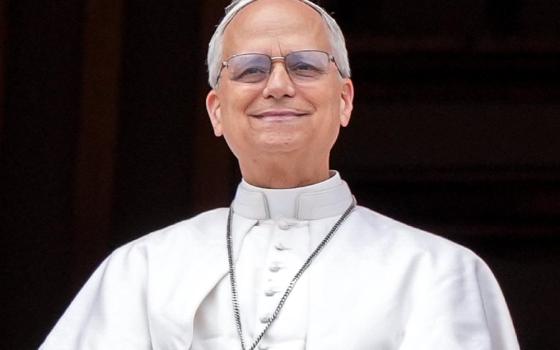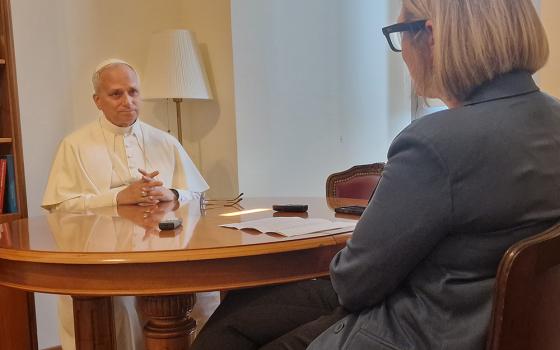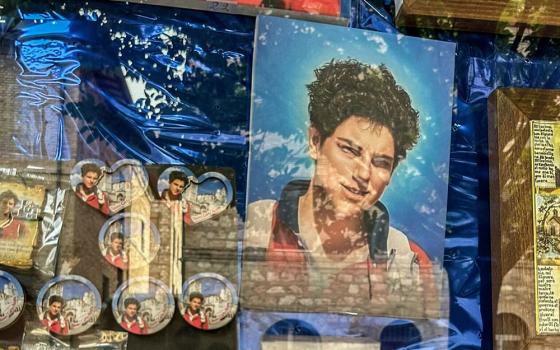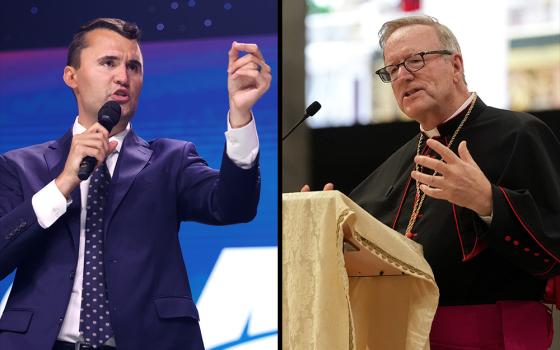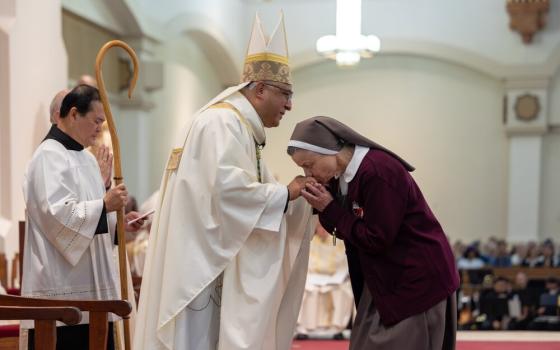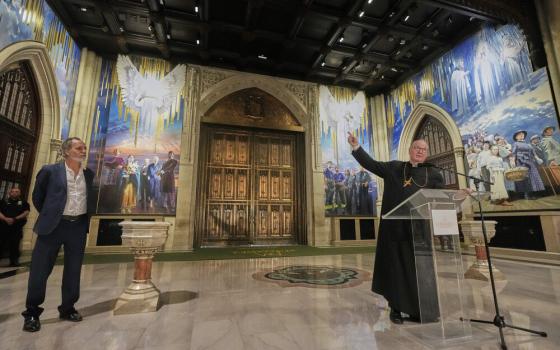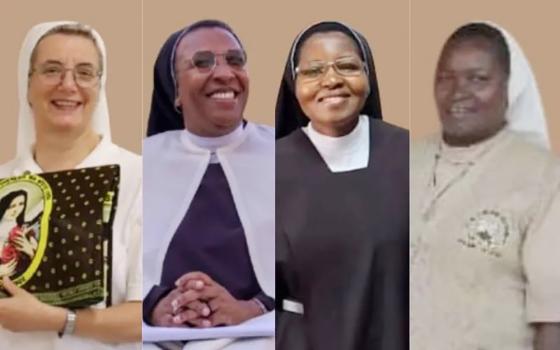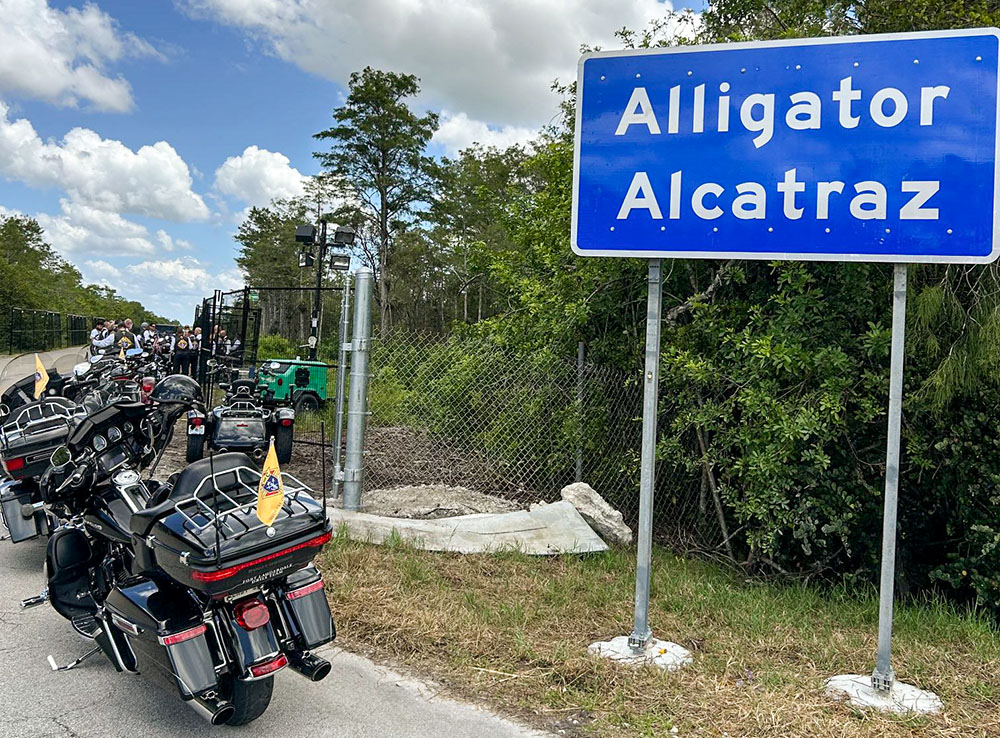
Motorcycles ridden by Miami Archbishop Thomas Wenski and Knights on Bikes are parked in front of the entrance to Alligator Alcatraz, a controversial immigration detention facility some 55 miles from Miami in the Florida Everglades. The archbishop and his fellow bikers stopped to pray a rosary for detainees July 20, 2025. (OSV News/Thomas G. Wenski)
Catholic priests have been barred from providing religious services inside Florida's controversial new migrant detention facility — dubbed "Alligator Alcatraz" — nearly three weeks after it opened deep in the Everglades, the archbishop of Miami said.
Archbishop Thomas Wenski in an interview with the National Catholic Reporter said that state and federal officials have spent the past three weeks deflecting responsibility over giving Catholic priests access to the facility, leaving the archdiocese in limbo.
"They could build that place in less than a week, so it doesn't seem that it should take two or three weeks to tell the archbishop of Miami his priest can go in to minister to the detainees," Wenski said on Monday, July 21.
Clergy's lack of access to migrants in the custody of Immigration and Customs Enforcement isn't isolated to Miami. Priests and ministers from coast to coast say they aren't being allowed into migrant detention facilities to provide counseling and religious services.
In California, evangelical leaders in a statement expressed concern about the limited access. "Government must not impose restrictions on churches, individuals, or faith-based organizations that offer spiritual or material support to immigrants — regardless of legal status."
Advertisement
Pastors from an Indonesian church in the Los Angeles area told Christianity Today earlier this month that they had waited in vain for hours to see one of their congregants who had been arrested days earlier and had been detained at the Metropolitan Detention Center, the basement lockup inside the federal court complex.
In the first Trump administration, access to pastors in ICE detention centers nationwide was a problem, Religion News Service reported in 2018. Visits from clergy and spiritual advisers were inconsistent. Bibles and religious materials were not made available. And detainees often were not afforded the opportunity to participate in religious worship services, RNS reported.
Bikes parked, heads bowed in prayer
Fifty-five miles south of Miami, outside Alligator Alcatraz on Sunday, July 20, Wenski and about two dozen Knights of Columbus on motorcycles — known as Knights on Bikes — gathered to pray and draw attention to the slow-moving process of gaining access.
Wenski and the Knights on Bikes ministry prayed the rosary outside the entrance of the facility in the Everglades. After the service, the Florida Highway Patrol trooper guarding the entrance — who had blocked the ministry from entering the facility — accepted a blessing from the archbishop.
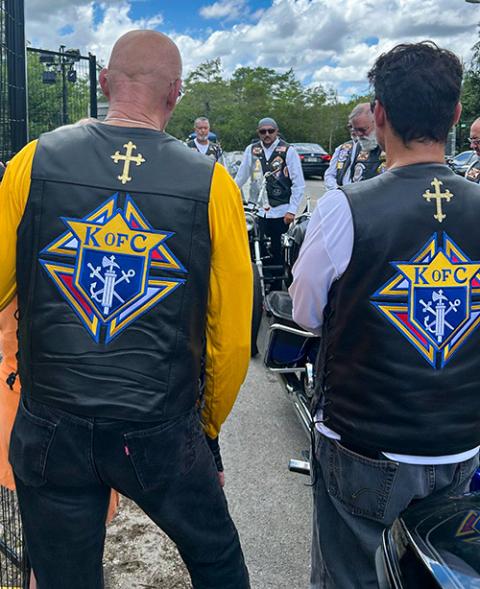
Knights on Bikes pray the rosary for detainees at the entrance to Alligator Alcatraz in the Florida Everglades, July 20, 2025. (OSV News/Thomas G. Wenski)
Images shared by the archbishop showed the men standing in a circle, bikes parked and heads bowed in prayer, with the Knights of Columbus logo and a cross prominently stitched on the back of their vests.
The Miami facility, which opened July 3 after just two weeks of fast-tracked construction, is being touted by Florida Gov. Ron DeSantis' administration as a new model for holding migrants ensnared in President Donald Trump's war on illegal immigration.
The detention facility is overseen by the Florida Division of Emergency Management and is initially funded by $450 million in state money, along with additional support from the federal government, a U.S. Department of Homeland Security spokesperson told PolitiFact.
Wenski said neither the state nor the federal government by early Wednesday had provided his office with a timeline for when Catholic priests would be allowed to enter. The archbishop hopes the matter can be resolved this week, but expressed frustrations about navigating the "bureaucratic red tape."
U.S. Immigration and Customs Enforcement regulations require detention facilities to provide detainees of different religious beliefs with "reasonable and equitable opportunities to participate in the practices of their respective faiths, constrained only by concerns about safety, security and the orderly operation of the facility."
Asked about whether Alligator Alcatraz detainees had access to any religious services — Catholic or otherwise — Wenski said he wasn't sure. But based on the likely ethnic makeup of the detainee population, which he said includes many Latin Americans and Haitians, Catholic services would probably be their preferred form of worship.
Florida emergency management spokesperson Stephanie Hartman did not respond to an emailed list of questions about Alligator Alcatraz detainees' access to religious services and when the Miami Archdiocese would be able to enter the facility.
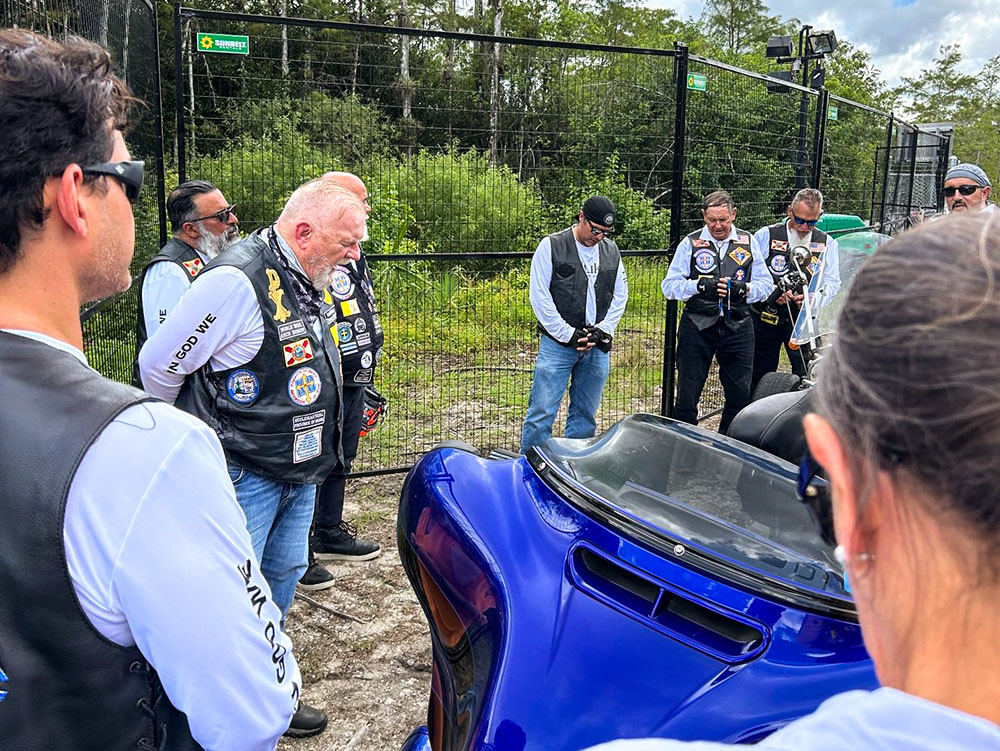
Archbishop Thomas Wenski of Miami and Knights on Bikes pray the rosary for detainees at the entrance to Alligator Alcatraz, a controversial immigration detention facility some 55 miles from Miami in the Florida Everglades, July 20, 2025. (OSV News/Thomas G. Wenski)
'No right to religion'
Wenski, a Palm Beach County native who was appointed by Pope Benedict XIV in 2010 to lead the Miami Archdiocese, said priests regularly visit state and federal detention facilities, including the Krome Detention Center in Miami.
During Lent, Krome officials told a priest in Wenski's congregation that he couldn't visit the facility because it was overcrowded.
"I told them that's not an acceptable reason," Wenski said.
With the help of U.S. Rep. Carlos Gimenez, a Cuban-born Republican representing Monroe County and parts of Miami-Dade County, Wenski said he was able to visit Krome on Easter to celebrate two Masses with a total of 160 people.
Religious services can have a "calming effect" for staff at Alligator Alcatraz — not just detainees, he said. "It is an affirmation that they're not forgotten, that they're not alone," Wenski said.
"Denying those religious services is, in many ways, denying their humanity, denying their dignity and wanting them to feel totally abandoned and alone," the archbishop said. "That's really not what we should be about."
The DeSantis administration and Republican state lawmakers have repeatedly denied media reports detailing harsh living conditions at the nascent detention center. Some detainees' accounts include giant mosquitos and insects, maggot-infested food and drastic fluctuations in the facility's temperature.
One detainee told CBS News Miami earlier this month that Alligator Alcatraz staff confiscated his Bible and told him "here there is no right to religion," according to an English translation of the account, originally delivered in Spanish during a phone call. Wenski described the account as an "unacceptable" violation of the man's freedom of religion.
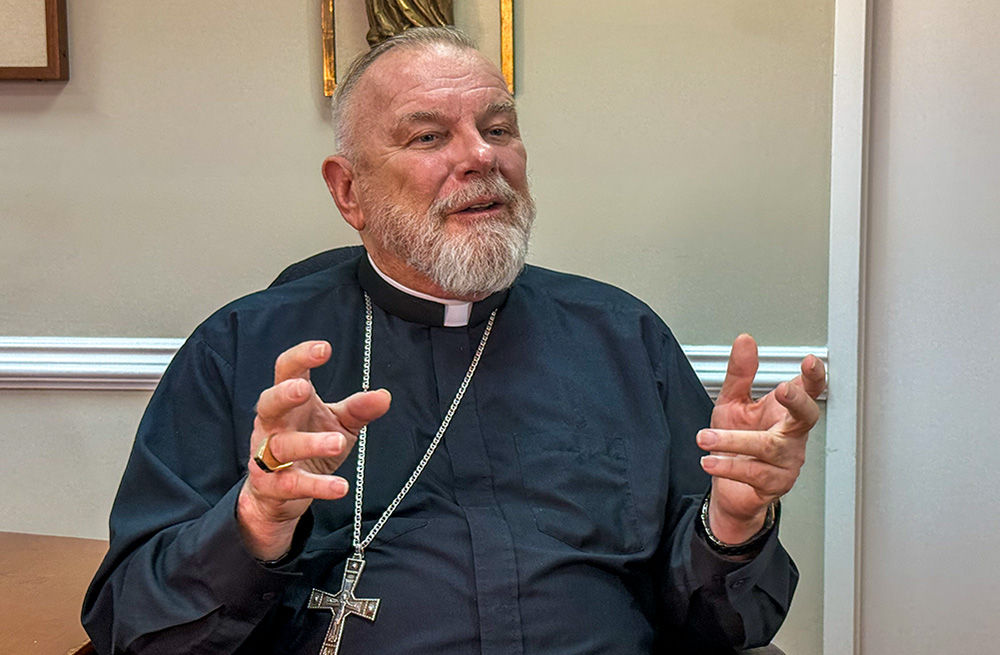
Miami Archbishop Thomas Wenski speaks with reporters July 21, 2025, at the pastoral center of the Miami Archdiocese in Miami Shores, Fla. (NCR photo/Garrett Shanley)
No response from DeSantis
DeSantis, a Catholic who attended Our Lady of Lourdes Catholic School in Miami, has not publicly addressed the controversy. The governor's office did not immediately respond to a request for comment.
Last week, DeSantis touted Florida's top-ranked status in the First Liberty Institute's Religious Liberty in the States Index. Religious liberty, the governor said in a news release, "is critical to the foundation and function of America, and I am proud that Florida excels in protecting this right."
Past an apparent lack of access to pastoral services, Wenski raised concerns over Alligator Alcatraz's remote location, an isolated airstrip roughly 40 miles from the nearest hospital. The facility's tent structure also leaves staff and detainees vulnerable to local fauna — including alligators — and extreme weather.
"Gov. DeSantis doesn't think there's a problem with hurricanes in the middle of the Everglades," Wenski said. "We hope he's right, but we can't know that right now."
Wenski also said it seemed as if the DeSantis administration picked the "Alligator Alcatraz" moniker — meant to play up its remote, swampy location — in order to make "fun of the misery and the pain" of detainees and their families.
The archbishop noted that as he led the rosary Sunday night, a man wearing a Trump T-shirt was selling "alligator swag" at a booth across the street.
"Everybody's trying to make a buck, I guess," Wenski said.
This story was produced in collaboration with Fresh Take Florida, a news service of the University of Florida College of Journalism and Communications.

